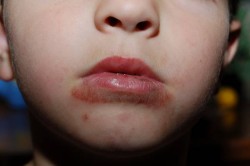Soybeans can be eaten whole or eaten in its processed form in various products in the market such as soy milk, soy protein isolate and tofu. There are also supplements that contain chemicals from soy that can be consumed. Even though soy is considered safe for many individuals, there are certain issues regarding the safety of consuming some soy products.
Allergic reaction
One issue linked with soy products are allergies. It is important to note that soy allergy typically starts as a result of a reaction to soy-based infant formulas. Most cases of allergies to soy can cause only minor symptoms such as skin rashes, hives or tingling sensation in the mouth.
As for severe allergies, it can cause swelling of the lips and face, dizziness, wheezing, runny nose, fainting or lightheadedness. In some cases, the breathing of the individual is impaired, thus requiring immediate medical attention.
When it comes to severe allergic reactions or anaphylaxis, it requires immediate medical assistance. Do not hesitate to call for emergency assistance or bring the individual to the nearest emergency department.

Connection of soy and cancer
There is also a growing concern that soy products can contribute to some hormonal-based cancers such as uterine, breast and ovarian cancer. It is important to note that soy contains chemicals called as isoflavones that are similar in nature to the hormone estrogen. The erratic estrogen signaling can contribute to the development of cancer cells that respond to this hormone which occurs with uterine, breast and ovarian cancer. Understandably, the isoflavones might be able to promote the growth of these types of cancer.
Using supplements
Some soy-based supplements are used by women in an attempt to reduce some of the symptoms of menopause such as bone loss and hot flashes. Take note that these supplements usually contain elevated amounts of isoflavones.
A certain kind of soy supplement called as soy hypocotyl isoflavones has been under study to check if they can cause an increased risk for uterine or breast cancer as well as other health issues. Even though soy hypocotyl isoflavones are considered safe, other types of soy supplements can put an individual at higher risk for cancer.
Link between soy and gout
Soy protein is known to contribute to gout. Take note that gout is a form of arthritis that is due to the formation of uric acid crystals in the joints. This causes intense pain and inflammation, especially in the big toe.
Gout can be triggered by consuming foods that are packed with purines since this is metabolized into uric acid. Soy is known to contain a moderate amount of purines. It simply means that soy products are not suitable for individuals suffering from gout. The individual should consult a doctor regarding the foods to avoid if diagnosed with gout.
